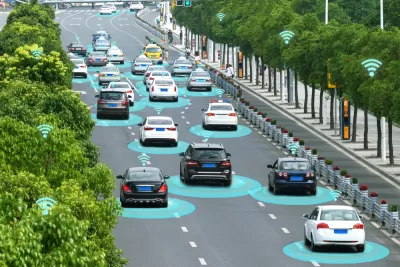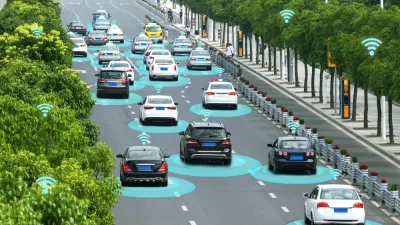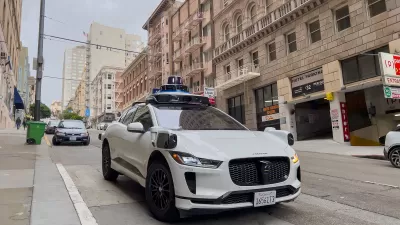A study about planning for AVs shows that most cities are not actively working to prepare for them and officials are worried about the many potential effects they will have on cities.

A new article in the Journal of the American Planning Association takes a closer look at how cities are preparing for autonomous vehicles. MIT researchers reviewed plans from the 25 largest U.S. cities and surveyed transportation and planning officials in 120 cities across the country.
The findings show that few cities have started preparing for AVs. "Only a tiny fraction of survey respondents said that their town had a 'clear plan' for autonomous vehicles, and just 36 percent of the largest cities have general plans that mention AVs. Even fewer, 24 percent, have issued separate strategies for maximizing the possible safety and congestion-easing benefits of self-driving cars," reports Laura Bliss.
Most cities report that they are waiting on federal or state legislation to come through and larger, more populated cities are more likely to be prepared. And while officials are looking to the benefits of AVs on roads, a third of respondents are also concerned about the potential negative impacts of the vehicles, including increases in vehicle miles traveled and sprawl and decreases in transit ridership and local revenues.
FULL STORY: Why Aren’t Cities Getting Ready for Autonomous Vehicles?

Alabama: Trump Terminates Settlements for Black Communities Harmed By Raw Sewage
Trump deemed the landmark civil rights agreement “illegal DEI and environmental justice policy.”

Study: Maui’s Plan to Convert Vacation Rentals to Long-Term Housing Could Cause Nearly $1 Billion Economic Loss
The plan would reduce visitor accommodation by 25% resulting in 1,900 jobs lost.

Planetizen Federal Action Tracker
A weekly monitor of how Trump’s orders and actions are impacting planners and planning in America.

Waymo Gets Permission to Map SF’s Market Street
If allowed to operate on the traffic-restricted street, Waymo’s autonomous taxis would have a leg up over ride-hailing competitors — and counter the city’s efforts to grow bike and pedestrian on the thoroughfare.

Parklet Symposium Highlights the Success of Shared Spaces
Parklets got a boost during the Covid-19 pandemic, when the concept was translated to outdoor dining programs that offered restaurants a lifeline during the shutdown.

Federal Homelessness Agency Places Entire Staff on Leave
The U.S. Interagency Council on Homelessness is the only federal agency dedicated to preventing and ending homelessness.
Urban Design for Planners 1: Software Tools
This six-course series explores essential urban design concepts using open source software and equips planners with the tools they need to participate fully in the urban design process.
Planning for Universal Design
Learn the tools for implementing Universal Design in planning regulations.
Caltrans
Smith Gee Studio
Institute for Housing and Urban Development Studies (IHS)
City of Grandview
Harvard GSD Executive Education
Toledo-Lucas County Plan Commissions
Salt Lake City
NYU Wagner Graduate School of Public Service




























